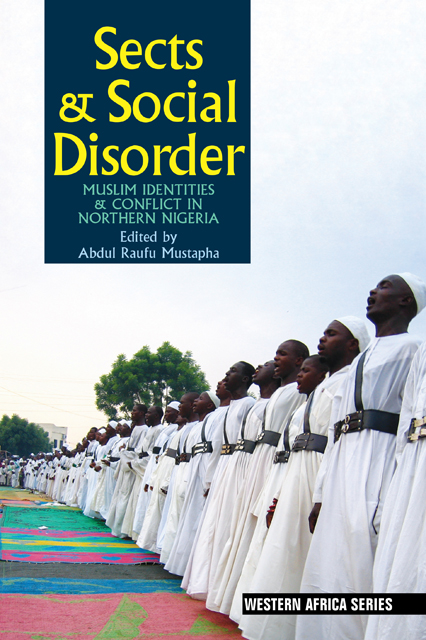Book contents
- Frontmatter
- Dedication
- Contents
- List of Maps, Figures & Tables
- Notes on Contributors
- Foreword by Muhammad Sani Umar
- Acknowledgements
- Glossary
- 1 Introduction: Interpreting Islam: Sufis, Salafists, Shi’ites & Islamists in northern Nigeria
- 2 From dissent to dissidence: The genesis & development of reformist Islamic groups in northern Nigeria
- 3 Contemporary Islamic sects & groups in northern Nigeria
- 4 Experiencing inequality at close range: Almajiri students & Qur’anic schools in Kano
- 5 ‘Marginal Muslims’: Ethnic identity & the Umma in Kano
- 6 Understanding Boko Haram
- 7 Conclusion: Religious sectarianism, poor governance & conflict
- Index
5 - ‘Marginal Muslims’: Ethnic identity & the Umma in Kano
Published online by Cambridge University Press: 24 February 2023
- Frontmatter
- Dedication
- Contents
- List of Maps, Figures & Tables
- Notes on Contributors
- Foreword by Muhammad Sani Umar
- Acknowledgements
- Glossary
- 1 Introduction: Interpreting Islam: Sufis, Salafists, Shi’ites & Islamists in northern Nigeria
- 2 From dissent to dissidence: The genesis & development of reformist Islamic groups in northern Nigeria
- 3 Contemporary Islamic sects & groups in northern Nigeria
- 4 Experiencing inequality at close range: Almajiri students & Qur’anic schools in Kano
- 5 ‘Marginal Muslims’: Ethnic identity & the Umma in Kano
- 6 Understanding Boko Haram
- 7 Conclusion: Religious sectarianism, poor governance & conflict
- Index
Summary
Introduction
Contemporary studies of ethno-religious conflicts in Africa have been particularly interested in protracted social conflicts. Such conflicts have been defined as hostile and violent interactions between identity groups over a long time, based on deep-seated ethnic, racial and religious hatred, structural cleavages between the conflicting groups, and the political oppression of some groups along with the denial of their fundamental needs (Fisher 1993). The focus on identity groups has come to shape the discourse of faith in Africa as a competition between the two big monotheistic religions – Islam and Christianity. The 2010 Pew study on the growth of both religions in Sub-Saharan Africa should be viewed against this background. A similar bifurcated understanding of religious conflict has largely characterized the academic landscape of Nigeria. However, side by side with these conflicts between the two great religions are meso-level conflicts taking place within each faith. It is therefore important not to concentrate only on inter-faith conflicts, but also to examine the intra-faith dynamics of religious conflict. This study of Muslim minorities falls within this exploration of intra-faith conflicts as it focuses on the numerically significant but often overlooked communities of non-Hausa Muslims in Kano. At the core of our enquiry is the question of the impact of ethnicity on Muslim self-perception.
Through the examination of the experiences of non-Hausa Muslims in the largely Muslim Hausa-Fulani city of Kano, we can observe the consequences of ethnic cleavage for the Muslim umma of Kano. The story of the non-Hausa Muslims in Kano is one with parallels throughout urban spaces in northern Nigeria. The contribution of this chapter will therefore be to make more nuanced the usual dichotomous – Muslim against Christian – representations of religious conflict in the north. This will enhance our understanding of minority Muslim communities and their role in the religious conflicts that have plagued northern cities like Kano. The acceptance of diversity of Islamic practice and of differences of understanding is critical to the development of greater tolerance. Indeed the foundation of religious fundamentalism is the rejection of internal diversity within Islam and the attempt to consolidate a ‘true’ and ‘pure’ line, ritual or theology. As we demonstrate in this chapter, the refusal to tolerate difference within the Muslim community is not only sectarian, it is also ethnic.
- Type
- Chapter
- Information
- Sects and Social DisorderMuslim Identities and Conflict in Northern Nigeria, pp. 126 - 146Publisher: Boydell & BrewerPrint publication year: 2014
- 1
- Cited by



